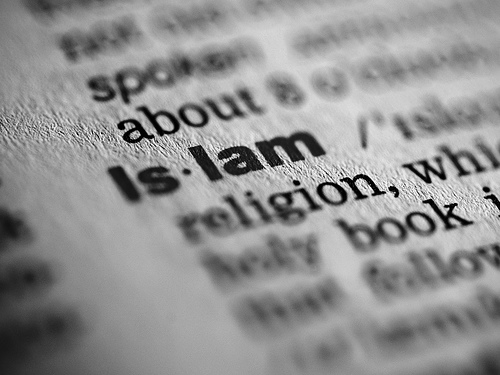We run our website the way we wished the whole internet worked: we provide high quality original content with no ads. We are funded solely by your direct support. Please consider supporting this project.

Is Islam Inherently Violent?
An increasing number of people, especially in conservative Christian circles, are claiming that Islam is an inherently violent religion. They point to all the violence in the history of Islam and all of the violence being carried out by Muslims today as proof of this. I believe this claim is as misguided as it is dangerous.
Two considerations demonstrate the erroneous and prejudicial nature of this claim. First, the percentage of Muslims engaging in violence today is a minute fraction of the total Muslim population, which is now around 1.6 billion (23% of the world’s population). If you add together even the highest estimates of participants in all the Islamic extremist groups (e.g., ISIS, Al Queda, the Taliban, Boko Haram), the total is a fraction of 1% of this population. Claiming Islam is inherently violent on the basis of the behavior of a tiny minority of professing Muslims is like claiming Christianity is inherently racist because groups like the Aryan Nation and Ku Klux Klan profess to be Christian.
Second, if the violence of professing Muslims proves Islam is inherently violent, then consistency demands that we conclude that the Christian religion also is inherently violent, for up until three and half centuries ago, professing Christians routinely engaged in violence that was every bit as barbaric as what Islam extremists are doing today. Beyond the horrific Crusades and Inquisition, there was a century and a half (1524-1648) of almost uninterrupted Christian-on-Christian violence that wiped out a significant percentage of the population of large sections of Europe.
It wasn’t radical extremist groups that claimed to be Christian that carried out this violence. All the violence of this period and throughout Church history was sanctioned by all the major ecclesial denominations and carried out by mainstream professing Christians. To their credit, the only Christians that abstained from this bloodletting were Anabaptists, and they were almost completely exterminated by the other groups. So if, in spite of all this violence, Christians today do not want to accept that the Christian religion is inherently violent, then Christians must stop claiming that the violence of professing Muslims implies that Islam is inherently violent.
Now, some will object that religiously motivated violence on the part of Christians is a thing of the past, proving that the Christian religion is not inherently violent. Thankfully, it is for the most part true that we no longer see Christian organizations carrying out violence. But this is not because Christians suddenly matured three hundred years ago and realized their violence was inconsistent with their religious convictions. Christians only stopped killing their religious and political adversaries because secular authorities decided this relentless warfare was politically and economically disadvantageous, so they agreed to make religious violence illegal (the “Peace of Westphalia,” 1648).
It was at this time that the West thankfully began to finally embrace the idea of a neutral secular state that had been proposed by Thomas Hobbs (1588-1679) and others. While some have tried to argue that the concept of a neutral state protecting the freedom and rights of people of different faiths was birthed out of Christianity, it was actually birthed out of a secular reaction to a century and a half of “Christian” states that were violently trampling on this freedom and these rights. (A good book on this is The Stillborn God: Religion, Politics, and the Modern West, by Mark Lilla).
So you see, the reason why a minority of Muslims continue to engage in religiously motivated violence while Christians do not is not because Islam is inherently violent while Christianity is not. It’s rather because Islamic countries have not, on the whole, embraced the concept of a secular neutral state, outlawing religious violence. In fact, while the secular concept of tolerance has now become deeply ingrained in westerners, I am convinced that, if there were no laws preventing religiously motivated violence, masses of western Christians would still be carrying it out, and I, for one, would likely have years ago gone the way of Michael Servetus!
To close, while I’ve argued that Islam is no more inherently violent than the Christian religion, one could easily turn the tables and argue that both religions, and even all religions, are to some degree inclined toward violence. For as long as people place their ultimate allegiance to a belief above loving other people at all costs, they will feel justified, whenever they deem it necessary, to kill people in the name of their belief.
The only ultimate allegiance that cannot ever lead to violence is the allegiance to the one who commanded his disciples to sacrificially love and do good to all people, including life-threatening enemies (Mt 5:38-47; Lk 6:27-36). Those who share this ultimate allegiance do not adhere to a religion; they rather manifest the Father’s kingdom. And they are grateful for secular authorities that protect them from those who embrace religion, whether it be the religion of Islam or of Christianity.
Image by FirasMT via Flickr
Category: Q&A
Tags: Christianity, Islam, Religion, Religious Violence, Violence
Related Reading

The Radically Distinct Kingdom of God
Yesterday, we posted a video where Greg mentioned the radical distinction between the kingdom of God and the governments of the world. The following explains this distinction further. Nothing is more important to the cause of the kingdom of God than actually living out a Christlike vision of the kingdom. Or to put it in…

Why Bart Ehrman Doesn’t Have to Ruin Your Christmas (Or Your Faith) Part 5
This is the fifth of several videos Greg put together to refute Bart Ehrman’s claims published in the article What Do We Really Know About Jesus? In this segment, Greg points out that none of Bart’s material are new discoveries. Even the most conservative scholars in this field are aware of them, and yet, none of them…

Love and Violence
What does it mean to confess that “God is love” and that we are called to “live in love” (Eph. 5:2)? One of the more common ways of understanding God’s love has its roots in the teachings of Augustine. He adamantly affirmed that the revelation that “God is love” lies at heart of the Gospel…

Join the Revolution!
We are living at a very important, and very exciting, juncture of history. The old religion of Christendom that has been identified with “Christianity” the last 1600 years is dying, and out of its ruins is arising a new tribe of kingdom revolutionaries. All around the globe people are getting the revelation that the kingdom…

What Can We Do About Gun Violence? The Rex Harsin Interview (podcast)
Dan talks with Rex Harsin about his new documentary called “Beating Guns,” made with Shane Claiborne and Michael Martin of RAWTools. What does it mean to believe in and follow a non-violent savior while wielding a gun? Can a Christian be a peacemaker while being licensed to carry? What does it mean to be a follower…

Podcast: How Can I Protect My Kids from the Violence in Media?
Greg looks at ways to help strengthen non-violence in children in a world saturated in violence. http://traffic.libsyn.com/askgregboyd/Episode_0308.mp3
